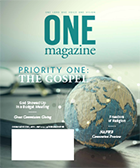
April-May 2019
Priority One:
The Gospel
------------------
|





When I Am Weak
By Ruth McDonald
I was only five years old when I made my rash vow. Recovering from an embarrassing emotional outburst, I told my mother between hiccups and snuffles, “Mommy, I promise I’ll never cry again.” I was very upset when she and Dad broke into laughter at my ever-so-sincere but impossible pledge.
Grownup me knows what little girl me didn’t—it is no shame to cry. I need not be embarrassed to show my humanity, my weakness, or my emotional response. According to the Bible, “when I am weak, then I am strong” (2 Corinthians 12:10).
My husband and I moved to Japan when I was 25 years old. People often ask, “Where did you grow up?” I always want to answer them tongue-in-cheek, “In Japan.” Of course, I realize that’s not the answer they’re hunting, but seriously…I’ve done most of my maturing in Japan. The challenges of living overseas never really end, but those first few years were especially difficult. I cried. A lot.
Just to review, the first four years included leaving everyone and everything we knew, moving to a new country sight unseen, two years of full-time language study, giving birth to my first (and second) baby without family in an unfamiliar culture, adapting to parenthood, and jumping into a ministry way over our heads. At the end of the term, as I was saying goodbye to Japanese friends, they started in with the “Oh, you are so strong!” speech. After a few minutes of that, my closest friend in the group spoke up and said, “Actually, she’s not really that strong. In fact, she’s kind of a ‘cry-bug’” (Japanese for “cry-baby”). I took the opportunity to tell them the only reason I’d been able to hang in there was through the strength I’d found in Christ.
As a young missionary, I lived by the motto “You’re the only Jesus some will ever see.” My sincere goal and mantra was “To be like Jesus.” This goal is worthy, lofty, and still very much a part of my prayers. I hope to look and act more like Jesus every day I live. But there’s one big problem: I’m not Jesus.
No matter how hard I try, it is impossible for me to perfectly show Jesus to the world. I’m not perfect, nor will I ever be. My humanity remains and rears its ugly head repeatedly. And the watching world sees it. They know I am weak. The burden of trying to be Jesus was a crushing weight. Afraid they’d see my weakness, I sometimes chose to hide that weakness, or worse, pretend I had it together when I did not. I thought God couldn’t use me until my Christlikeness score was at least in the A range.
During my 30s, I experienced one of my life’s most defining losses. At the beginning of my fifth month of pregnancy, our fourth child’s heart stopped beating. Alone in the doctor’s office, I processed the news, and my first reaction was stellar: “The Lord giveth and the Lord taketh away. Blessed be the name of the Lord.”
Over the course of the next weeks, however, my glowing faith morphed into something darker. Laboring to deliver my dead baby while surrounded by the sounds of newborns crying, my praise became anger. Signing the papers for Noah Christian’s cremation and going home with my arms and womb empty, my anger turned to doubt, and there I stayed. Using physical recovery as an excuse, I didn’t attend church for weeks. I wasn’t praising God in the darkness…I was mad. It seemed unfair. I wondered for the first time whether God was actually good. I was not experiencing the comfort about which I’d always heard. I felt like I was alone, and God didn’t care.
It was truly a crisis of faith, one that finally ended with a three a.m. surrender to God and His sovereignty. Even though I was in pain and still didn’t understand the “why,” I chose to believe in the goodness of God. Floodgates of comfort and healing opened, and I began to experience God in a way I never had. Since that moment, I’ve often thought about a willful child, flailing and beating against her daddy’s chest. Our Abba Father patiently waits for us to get through the tantrum, cry it out, and calm down. He’s big enough to take it and loving enough to pour out His comfort when we’re ready to receive it.
Even as my spirit healed, I struggled with a tremendous weight of guilt. I thought I had completely blown it, that I had wasted the whole experience by not glorifying God during those difficult weeks. The world was watching, and I had failed to show them Jesus. Then some fascinating things occurred.
One day, a new believer in the church told me she had learned so much from watching me grieve. “In Japan,” she said, “pregnancy loss is not a big deal. We have a saying, ’If this batch of cake batter flops, you just throw it away and try again.’ But the depth of your grief made me start to think differently. I read in the Psalms about how God made us and knew us from the womb, and I realized it really is a big deal.”
A few days later, a mature Christian sister remarked, “Ruth, all of us at the church have learned so much by the depth of your grieving. We were all so surprised you grieved as though you’d actually lost a child. And then we realized for the first time that, according to the Bible, you did lose a child. We were taken aback.”
Abortion has been legal in Japan since 1949, and approximately three in ten women in Japan have had an abortion. Because abortion creates no social outcry or controversy, even Christian women have to grow into a biblical perspective on the subject. Incredibly, God used my weakness to display His truth. Others grew in faith, not because I was strong, but because I was not.
I began to understand experientially what Paul wrote in 1 Corinthians 12:9, “And he said unto me, My grace is sufficient for thee: for my strength is made perfect in weakness. Most gladly therefore will I rather glory in my infirmities, that the power of Christ may rest upon me.” When we are strong, people look at us and say: “Wow, they are really something!” But when we desperately cling to God in our weakness, people watch and say, “Wow! God is really amazing!”
It is not, nor has it ever been, my job to be Jesus. My job, and yours, is to be myself and point people to Jesus. As we follow Christ, at times His strength makes us strong. Those are good times to brag on God’s power. At other times, we will be weak. Those are moments to brag on God’s patience, compassion, and help. Either way—weak or strong—all the glory belongs to God. After all, there is only one Savior. We are just signposts.
The Christian life is full of difficulties. We don’t do the watching world any favors when we pretend otherwise. In the past two-to-three years in Japan, we have experienced major health struggles, financial uncertainty, the death of several close friends, dissension in the church, our daughter’s depression, our granddaughter’s life-threatening illness, closed doors in ministry, and the loss of my mother. This has not been a season of strength, but one of throwing ourselves on the mercy of God. Our prayers were not pretty. They were raw, full of groaning, and often a simple, “Lord, help!” Though we clung to our faith in God, we were often unable to see our way ahead. My theme verse became: “We do not know what to do, but our eyes are on you” (2 Chronicles 20:12). At times, we wondered whether we were going to make it.
Both believing and unbelieving Japanese friends walked through these trials with us. They heard us tell of miraculous healings. They saw us deal with hurtful and discouraging setbacks. They saw us cry. Some cried with us. Sometimes our faith was strong. Sometimes it faltered. We fumbled the ball on a few occasions. But we didn’t pretend to be stronger than we were. We trusted God to use both our victories and our failures to bring glory to Him.
Japan is a sometimes-stoic country that values discipline, will power, and emotional stability. Japanese people encourage one another to “stay strong.” An alarming lack of support for those unable to repress their fears, pain, and struggles exists. This culture of “buck up” contributes to the fact that around 30,000 people commit suicide in Japan each year. When they can no longer handle the negative emotions, they snap.
As we muddled through the muck of these past years, God began to break down walls and open doors we never could have forced open. Women began to share personal stories with me. They asked me to pray for them and their loved ones. They opened up about their pain: unfaithful husbands, cancer, rebellious children, dysfunction, depression, abuse, and aging parents. Because they’d seen I sometimes wasn’t okay, they felt free to let me know they weren’t okay either.
It turned out to be one of our most fruitful terms. It was my privilege to pray with many unsaved friends and point them to Jesus. It was most certainly not my strength that opened their hearts. My weakness provided a beautiful backdrop, a showcase to display the brilliance of my Savior’s strength.
In his book Fresh Wind, Fresh Fire, Jim Cymbala said it this way: “I discovered an astonishing truth: God is attracted to weakness. He can’t resist those who humbly and honestly admit how desperately they need him. Our weakness, in fact, makes room for his power.”
About the Writer: Ruth McDonald and her husband Donnie are career missionaries to Japan. Learn more: www.IMInc.org.
|
|

